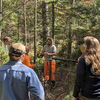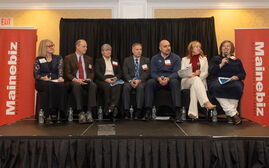In Maine, ‘value added’ is taking on new meaning
 Photo / John O’Meara
Rhett Fox at Fox Family Potato Chips in Mapleton has been in business for 23 years. He started with tiny equipment making small, time-consuming batches. Having just built a bigger facility, the business is thriving and expanding.
Photo / John O’Meara
Rhett Fox at Fox Family Potato Chips in Mapleton has been in business for 23 years. He started with tiny equipment making small, time-consuming batches. Having just built a bigger facility, the business is thriving and expanding.
Aroostook County is famous for its natural beauty, its natural resources and for agriculture. For many years, though, its agricultural products were processed elsewhere. The value in “value-added” often went to processors in other states or countries.
Now, there’s been a turn of fortune, and local businesses are again thriving because the processing and value adding is done here.
Although potatoes drive the economy in Aroostook County, potatoes as a commodity do not fetch a high price — especially where they are so abundant — in the County.
Potato chips are a different story.
Rhett Fox at Fox Family Potato Chips in Mapleton has been in business for 23 years. He started with tiny equipment making small, time-consuming batches. Having just built a bigger facility, the business is thriving and expanding.
“What I can do now every five minutes would take five hours when I started,” says Fox.
Fox Family Potato Chips is one of several Maine companies tackling a longstanding issue of the need for processing operations. We also talk to a grain processor in Skowhegan, a tortilla maker in Scarborough and a meat processor in Aroostook County.
Investment in equipment
Fox Family Potato Chips is seeing the advantages of a new processing facility and appropriately sized equipment. Sales are up too. Fox says that they now sell in a month what they sold in the entire year of 2014.
The bags of chips produced at Fox’s facility in Mapleton come in a bag with a distinctive logo. The bags show five hand-drawn foxes colored in red.
“My daughter drew the logo and my son filled it in,” says Fox. Although people have recommended that the logo be redone or cleaned up, Rhett Fox likes the way it looks. It has an appeal as distinctive as the flavor of Fox’s chips.
Fox has received a few small grants — during COVID — but mostly the business has grown because of demand and a claim of making good chips. Fox Family Potato Chips now sells throughout Maine and is moving into southern New England. Gross sales are over $1 million dollars a year.
The chips are also available online. Fox says they are in demand online because people learn to like them while visiting Maine.
“It turns out a lot of people vacation in Maine,” he quips.
Fox says that licensing and dealing with state regulations has gone smoothly.
“I have no complaints on that end,” he says.
Processing Burbank ru/sset potatoes is now more efficient with the more modern equipment.
“We used to have to handle the potato like seven times before we put it in the fryer. Now we don’t have to touch anything,” states Fox.
Fox chose Burbanks because of the flavor. “It’s not historically a chipping potato but that’s where the flavor comes from,” he says.
Although Fox Family Potato Chip Co. is expanding, processing and adding value to Aroostook’s abundant potato crop has its difficulties. Fox cites labor shortages as one of the challenges in any processing business.
A Skowhegan grain processor
Amber Lambke, CEO and co-founder of Maine Grains sells roughly 2 million pounds of processed grain a year. The Skowhegan business sells flour, beans, rolled oats and a variety of other grains, from buckwheat to rye. More than 75% of the grain is grown in Maine — and the mission of the company is to create a local food infrastructure.
“We network with 40 farmers throughout the Northeast,” says Lambke.
When the company was founded in 2012, the goals were more modest, she says.
“In our early years we had a goal of selling six tons of grain,” she says. Now, they are getting new equipment from Germany that will allow Maine Grains to also sell ready-to-eat products.
Maine Grains is expanding, says Lambke.
Lambke describes the state of Maine as quite supportive of her business. “It takes a lot of collaboration to do this,” she says. Maine Grains received some funding from Maine’s Community Development Block Grant Program, which is funded by the federal government. That funding went to efficient equipment. “Our governor also invested a lot of our COVID money into making sure Maine has a resilient agricultural sector,” she notes.
Elements of the wider economy can be rocky.
“The threat of tariffs creates some instability in the marketplace,” says Lambke.
In addition, the advent of modern weight-loss drugs has changed some consumer habits. Maine Grains focuses on what it calls high quality calories and may not be as vulnerable to general downswings in eating habits, the current trend may still cut into sales, Lambke says.
“All food industries are feeling the impact of weight loss drugs,” says Lambke. “People are consuming less.”
Meat processing
Although Maine has a storied history of quality livestock farming, some parts of the state lack infrastructure for processing. Like with grain and potatoes, livestock processing in Maine is on the upswing. Brady Hatch owns and operates Hatch’s Custom Meat Cutting in rural Crystal, in southern Aroostook County. Off the beaten path but accessible because of its proximity to I-95, Hatch’s slaughterhouse is a clean, modern, new facility sporting an array of solar panels on its roof.
Hatch had done just custom slaughtering for years — that is when a customer buys the animal or half of the animal live and hires the butcher to do the slaughtering and processing. Now, Hatch’s Custom Meat Cutting is state inspected. Farmers can bring an animal to the new facility and have it processed and sell the meat piece by piece to individual customers or restaurants or stores — even across state lines.
“The state came to me,” says Hatch.
During COVID and a steep rise in demand for local food, the state recognized that there was a need for more livestock processing and chose two slaughterhouses to upgrade. The state helped with a plan and eventually Hatch got grants that helped with modern equipment and infrastructure — and the solar panels.
“It took about a year to get it started. I am able to offer more products. I also expanded my cooler,” says Hatch.
Like with Amber Lambke and Rhett Fox, business is good at Hatch’s Custom Meat Cutting — even in tiny Crystal, which has a population of 248.
“My numbers are up this year from last year,” says Hatch.
Tortilla flats
Tortilleria Pachanga in Scarborough is also experiencing growth and steady demand. Owner Lynn Rowe makes yellow, blue and white tortilla’s from mostly locally grown corn. She has six part-time employees and sells to restaurants and natural food stores in Maine, moving about 15 tons of corn a year.
Rowe’s company got an infrastructure grant through the Department of Agriculture that allowed her to get a new delivery vehicle and upgrade some other equipment. The grant was competitive. “There were over 900 applicants and they awarded only 60 grants,” says Rowe.
There is a difference between selling to restaurants and selling to natural food stores. “The margin is always slim but it is smaller for restaurants,” she says, noting that the restaurants could certainly buy cheaper, mass produced tortillas but they choose local and high quality.
Small businesses make an owner busy. Rowe says she will be quite busy this summer until after the Common Ground Fair, when she hopes she will get a breather and be able to install some of the new equipment. Some of the new infrastructure will allow Tortilleria Pachanga to make chips on a small scale.














0 Comments